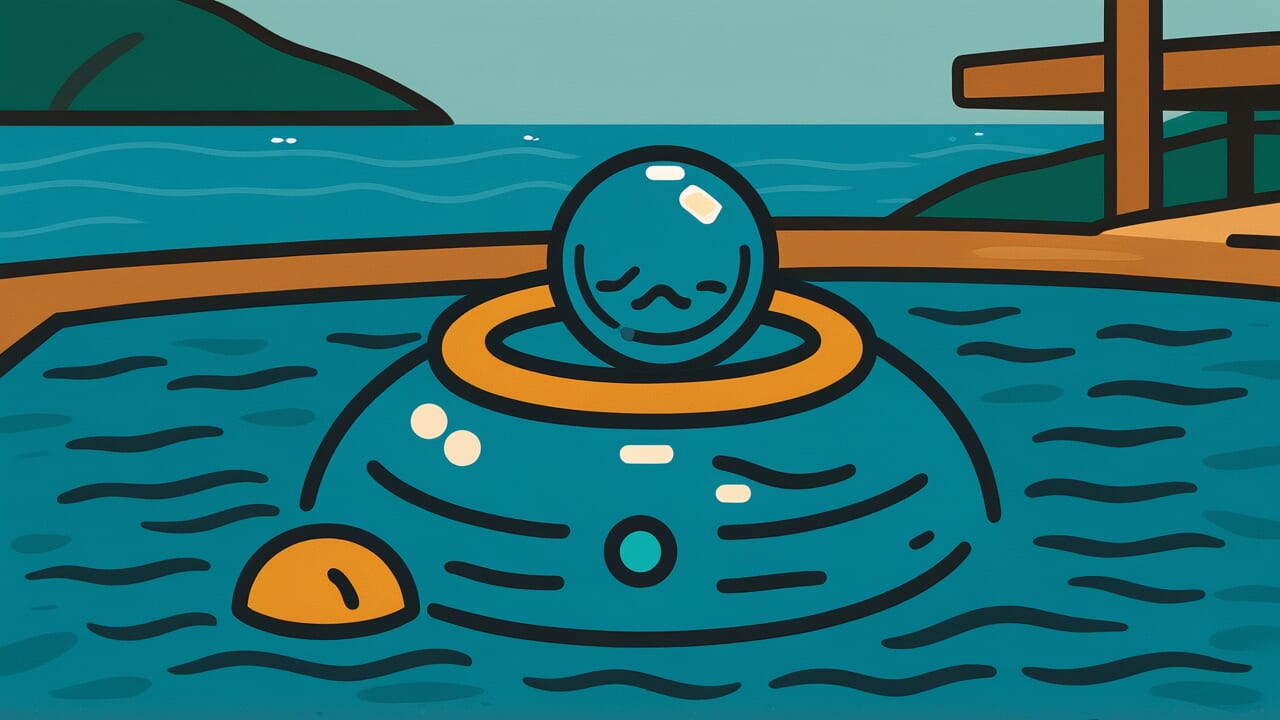How to Read “A pool with a jewel does not break its banks”
Tama aru fuchi wa kishi yaburezu
Meaning of “A pool with a jewel does not break its banks”
“A pool with a jewel does not break its banks” means that places containing valuable things are naturally protected and remain stable.
When a precious treasure lies at the bottom of a pool, people recognize its value and treat it carefully. This protects the banks from rough treatment that could damage them.
This proverb expresses a psychological truth about organizations and places. When talented people or valuable assets exist somewhere, those around them naturally want to protect them.
The presence of something valuable brings stability and prosperity to the entire place.
Today, we use this saying in various situations. When a company has excellent employees, the whole organization is treated with care.
When a region has precious cultural properties, the entire town receives protection. The proverb describes an interesting social phenomenon.
Having something valuable at the center keeps the surrounding environment in good condition too.
Origin and Etymology
The exact origin of this proverb is difficult to confirm in historical texts. However, the structure of the phrase offers interesting insights.
“Tama” refers to precious things like jewels or pearls. “Fuchi” means a deep place in a river or pond where water collects.
Since ancient times in Japan, people believed dragon gods lived in deep pools. These places were considered sacred and treated with great care.
Pools with beautiful jewels at the bottom were especially revered. People feared approaching them and avoided interfering with them carelessly.
This expression reflects both reverence for nature and the human instinct to protect valuable things. Places where treasures sleep were handled carefully by people.
As a result, they were protected from rough actions that could break the banks.
The geographical feature of a pool itself also has meaning. Deep pools have calm water flow.
Strong currents rarely erode the banks in such places. This natural principle combined with people’s psychology of cherishing valuable things.
Together, they created this proverb. The phrase weaves together both nature observation and human psychology.
It represents a crystallization of Japanese wisdom.
Usage Examples
- That long-established inn has a famous proprietress, so “a pool with a jewel does not break its banks” – all the employees work with pride
- Inviting an excellent researcher raised the entire university’s reputation – truly “a pool with a jewel does not break its banks”
Universal Wisdom
The proverb “a pool with a jewel does not break its banks” reveals a deep truth about human society. We might call it the magnetic force of value.
Humans have an instinctive desire to protect valuable things. This isn’t mere possessiveness.
It’s a higher wish to preserve beautiful, excellent, and precious things for future generations. This desire may be the driving force that built civilizations and passed down cultures.
What’s fascinating is that valuable things have the power to protect their entire surroundings. A single treasure gives meaning to the whole place and changes people’s behavior.
This isn’t just physical protection. It’s also a mechanism that creates psychological unity and pride.
The proverb also teaches the importance of “recognizing value.” Even if a jewel exists, the pool won’t be protected unless people recognize it as a jewel.
In other words, having the eye to identify truly important things is where everything begins.
Our ancestors observed throughout history how valuable things attract people, unite them, and become a force that protects the whole.
This wisdom shows a fundamental principle for how humans form societies and maintain communities.
When AI Hears This
When water hits banks in a shallow river, the flow’s energy directly erodes them. But in a deep pool, large vortices form below the surface.
These vortices act as cushions that absorb the flow’s energy. In fluid dynamics, this is known as a “dissipative structure” where rotational motion converts energy into heat.
Essentially, destructive energy transforms into harmless heat.
Even more interesting is that deeper pools can maintain more stable vortex structures. Considering Reynolds numbers, depth helps turbulent flow maintain a state closer to stable laminar flow.
In shallow places, water currents directly strike the banks. In deep places, vortices stack in multiple layers.
The calm inner layers catch the violent outer flow. A multi-layered defense system forms naturally.
This phenomenon suggests the role of “depth” in organizations. Superficial knowledge or shallow authority easily crumbles when receiving criticism or waves of change directly from outside.
On the other hand, people with genuine ability or deep knowledge use that very “depth” to absorb critical energy and minimize friction with surroundings.
Like vortices, they can receive intense opinions while converting them into the thermal energy of constructive discussion.
The paradox that more valuable things don’t hurt their surroundings was actually a physical law all along.
Lessons for Today
This proverb teaches modern people the importance of having a “jewel” within yourself or your organization. It doesn’t have to be a material treasure.
Your talents, passions, integrity, and expertise are jewels. For organizations, unique technologies, excellent cultures, and trusted track records count too.
Having something valuable becomes the power that protects you and your surrounding environment.
At the same time, this proverb teaches the importance of cultivating “eyes that recognize value.” If you don’t notice nearby treasures and fail to cherish them, you might lose them before you know it.
Family presence, bonds with friends, local traditions, small daily joys – these all have value. By recognizing and cherishing these values, your life’s “pool” becomes stable and rich.
Most importantly, you can become someone’s “jewel.” If your existence becomes irreplaceable value to your family, workplace, or community, people who support you will naturally gather around you.
A stable environment will emerge. Efforts to be a valuable person are never wasted.



Comments